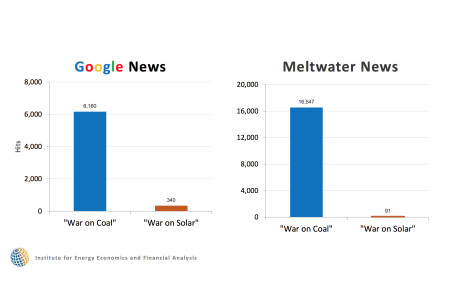You’ve most likely heard of the so-called “war on coal,” especially given how eagerly mainstream newspapers have helped conservatives in pushing this bogus meme. But there’s another war going on, one you probably haven’t heard of even though the outcome has major implications for the future of our planet.
That would be the “war on solar,” a concerted effort by vested fossil fuel interests and their political allies to hinder the progress of solar power, and more broadly attack all efforts to convert our society to run on clean, renewable energy sources.
Solar is a fast-growing clean energy industry that now employs 174,000 people, more than the coal industry. According to the Solar Energy Industries Association, the U.S. now has more than 20 gigawatts (GW) of installed solar capacity, enough to power four million American homes while contributing more than $15 billion to the American economy.
The aggressors in the war on the solar industry include some familiar names: the American Legislative Exchange Council (ALEC), Americans for Tax Reform and the Koch Brothers’ own Americans for Prosperity, organizations that are intent on rolling back policies — including the solar investment tax credit — designed to encourage solar energy development. These front groups for fossil fuel interests are determined to restrict the growth of the clean tech industries in favor of the dirty energy interests they’re beholden to for funding.
As Karl Cates of the Institute for Energy Economics and Financial Analysis writes, “the war on solar remains starkly underreported, and vastly deserving of much more and better coverage than it’s gotten so far.”
The goal of the war on solar, of course, is to kill a budding industry before it can get its legs. Much of its strategy is in a state-by-state campaign [that] employs two tactics: reducing state-government commitments to the percentage of energy acquired from renewables and repealing “net-metering” laws that fairly compensate homeowners and businesses for the solar energy they produce.
Net metering policies have been adopted in over 40 states and more than half a million homes and businesses in the U.S. have installed rooftop solar systems to generate their own energy. That pursuit of real energy independence rightfully scares the hell out of utility operators who, after years of fighting distributed solar, have resorted to trying to co-opt the business model instead.
Even the Walton Family, owners of Walmart, have used their billions to attack distributed solar, in part because it threatens the centralized, corporatist social structure that has made them filthy rich.
Coal, meanwhile, is responsible for 75% of the greenhouse gas emissions from the electricity sector even though it fuels just 39% of electricity generation in the U.S.
A future in which we have averted runaway global warming is a future without coal and with way more solar, yet mentions of the phrase “war on coal” dwarf those of “war on solar” in the media, as Cates points out with this graphic:
“Judging by press coverage both mainstream and marginal, there’s one epic fight—and pretty much one epic fight only—going on in America’s utility-energy industry: The ‘war on coal,’” Cates writes.
He adds: “The stakes in the war on solar are not insignificant.”
Indeed, when it comes to solar versus coal and the future of how we power our society, we are fighting for our very lives.
Image Credit: Andrej Vodolazhskyi / Shutterstock.com
Subscribe to our newsletter
Stay up to date with DeSmog news and alerts








